
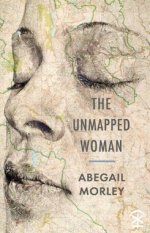 The Unmapped Woman Nine Arches Press, 2020
The Unmapped Woman Nine Arches Press, 2020
This deeply moving new collection explores the altitudes of trauma, mapping the stark new territory that loss leaves behind, where the landmarks of absence overfill with memories, where the missing loom large, casting their unshifting shadow.
“In The Unmapped Woman, Morley writes with astonishing technical virtuosity as she searches for recovery through art. As in her previous poems, water is a recurrent motif and the emotional core of the collection. Narrative and emotion are compressed within the single telling image, and the spaces between words, lineation and enjambment recollect the lost presence from where the poems emerge. George Eliot reminds us that ‘there is a great deal of unmapped country within us which would have to be taken into account in an explanation of our gusts and storms’. If Eliot seems to imply that what is most distinctive remains hidden, Morley speaks in a voice that is eloquent and precise as she seeks to understand what happens to the vanished.” – Nancy Gaffield
“Abegail Morley is a natural poet. Each poem seems exhaled in a single necessary breath as she unflinchingly addresses traumatic events. Her language is fresh, fluent and unadorned, with strikingly accurate images, and endings that make the reader re-consider the whole poem. The loss of a baby, suicide of a loved one and the concomitant depersonalisation of the self that dealing with such grief brings is covered with a magical lightness of touch. This is a highly talented, original voice well worth listening to.” – Patricia McCarthy
“The Unmapped Woman transports you deep under the surface of a life, to places too often skimmed. In it we find the grief we wear like a sweater that “I can’t quite bear to take off because each stitch yearns / for the next and the next and there’s no more next to give” (‘Bereavement’), the fragile expectancy of motherhood in which, “I don’t know / which one of us is the honey, which the bee, / or who has the nectar we drink so deeply.” (‘Daughter Bulb’), the ghosts that haunt us, and the beauty that ambushes us “in sun-trapped dust, gleam like a glassy far-off sea” (‘A Rough Guide to Grief: after reading the leaflet’). This collection, its probing intensity, is reminiscent of contemporary American masters like Louise Glück, Sharon Olds, and Carolyn Forché, yet decidedly British in tone. Morley knows exactly what she is doing here. The work stays with you, like “the way he planted a word in her mouth / to germinate after he’d gone.” (“The hollowing of the empty place”) These are poems to live with–tight as the skin of a drum.” – Robert Peake
..
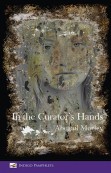 In the Curator’s Hands– Indigo Dreams Publishing
In the Curator’s Hands– Indigo Dreams Publishing
Abegail Morley takes on the voices of books, paper, documents, photographs and characters to create and curate a dystopian archive.
‘I’ve learnt how to undo in perfect order: this exemplary collection is poetry as inventory, played out in rich calibrations of textured and inventive language. Abegail Morley’s poems exist in an exciting tension of stasis and fluidity, as the curator’s paper, objects, artefacts, the body itself seek to unhusk
their inner life and liberate their own
true inky voices.’
Robert Seatter
‘These are claustrophobic poems about degradation: of matter, the body, relationships, knowledge, and the certainty of words. In the underworld of the archive, Morley aims to ‘complicate the darkness.’ Her poems work as preservation techniques to ‘recall the names of those I’ve hoarded.’ Morley knows how to grip her readers’ attention and destabilise certainties in intriguing ways. In the Curator’s Hands is disturbing, intelligent and absorbing.’ – Heidi Williamson
.
 The Skin Diary – Nine Arches Press.
The Skin Diary – Nine Arches Press.
“Abegail Morley’s The Skin Diary is a house haunted by imagined children and a permeating tragedy. Time passes in lost months and tides; slips away grain by grain. In her wanderings, the narrator yearns for a child and laments the lover lost to an empty sky. He is in every creak of the stairs and peers between branches at the bottom of the garden. Heartbreak is carried around in supermarket carrier bags: first Waitrose, then Aldi. The Skin Diary somehow finds words for the ineffable in its search for hope and understanding.” – Martin Figura
‘Morley’s tight poems unlock the prescient pain of childhood that reflects later on in loss; when she writes ‘some pain/ is more intense than others’ there is sense that our pain can be limitless, but this collection seems to compartmentalise and analyse our human limitless capacity for pain and also our human limitations, with an emotional erudition that lifts even the banal into the realms of concatenating and complex subjective psychoanalysis. A life can be held within the construct of one person’s poetic contribution, and here is a poet who can hold her nerve and her entire psychological landscape within each multifariously conceived and consciously humane line.’ – Melissa Lee-Houghton
‘Like the sea after depth charges detonate, Abegail Morley’s poems churn with remnants and signifiers. She rounds again and again on meaning, coming at it from all angles, to wrest meaning from the quotidian. Morley’s art is self-sacrificial and wholly generous. The imaginary is carefully harnessed. The ‘nearly’ and ‘almost’ become solid and historical. ‘Could-bes’ tower across her landscapes, rightfully statuesque, cloud giants. This careful lexicon Morley offers us here is nothing but essential.’ – Graham Clifford
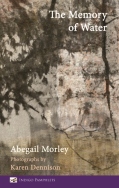 The Memory of Water Indigo Dreams.
The Memory of Water Indigo Dreams.
ISBN 978-1-909357-92-1 £6.00
“With her restless and undaunted imagination, Abegail Morley has already given us three of the most original collections of poetry in recent years. Using the metaphor of water as the carrier of the whispers of history, The Memory of Water takes her ever deeper into her own distinctive world.
Inspired by a residency in Scotney Castle in Kent, famous for its Medieval moat, these poems bring vivid life to actual voices of the past – a Catholic priest hiding from Elizabeth’s agents, a smuggler disposing of his victim’s body, another murderer faking his own death by filling his coffin with stones – and counterpoints them with invented characters in a music as fluid as their watery medium.
Karen Dennison’s shape-shifting photographs are a superb accompaniment to these startling and compelling poems.”
William Bedford
The Skin Diary is due spring 2016 from Nine Arches Press.
Many thanks to the editors of both books.
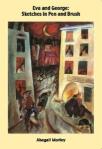
Eva and George – Sketches in Pen and Brush (Pindrop Press, 2013) 978-0957329034, £7.99
The latest Pindrop Press offering is a poetic account of the life of the artist George Grosz told through the voice of his wife, Eva Peter. An affecting sequence, Morley impresses with a startling account of a private and public existence in a Germany transforming itself after the First World War. Stark images of despots and outcasts mirror the artist’s paintings, but Morley’s engaging account of passion and malice, and dramatic exploration of Grosz’s inspiration, adds more colour to a richly imaginative collection. Poetry Book Society![]()
Abegail Morley’s sequence Eva and George, marked by both authenticity and originality, impresses with startling imagery and the striking juxtaposition of the private and the public. Her poetic account of George Grosz and Eva Peter’s life in the Weimar Republic is at the same time a compelling panorama of a whole era characterized by struggle, violence and radicalism. Dr Wolfgang Görtschacher, Poetry Salzburg Review/ Poetry Salzburg
Morley skilfully captures the rawness of George Grosz’s acerbic images of despots and outcasts in post WWI Germany, while tenderly evoking a portrait of the man behind the art. In lucidly-voiced poems spoken by his wife, Eva Peters, she explores the passion and compassion that drove him. In doing so she reminds us of the casual and calculated malice we are capable of inflicting on each other in daily living, and that ‘We are those passers-by. Heidi Williamson
These are fine hard-bitten poems with the imaginative strength and resonance to stand alongside the work of George Grosz without being in any way diminished by it. The realisation of Eva Peter’s voice is a triumph, and introduces Abegail Morley as one of our most impressive and rewarding poets. Peter Bennet
Sketches in Pen and Brush doesn’t lend itself to casual reading. It is a deep-welled cluster of information and ideology. An avant-garde textbook of sorts that could be generously bent to supplement readings into political sociology… Without a doubt Morley’s most ambitious work to date, and perhaps her most accomplished. Books like Eva and George – Sketches in Pen and Brush are no doubt vital to the on-going remembrance of a period of time that shook, and ultimately defined much of the Europe we inhabit today.
Ashleigh Davies
Eva and George depicts the satirical artist Georg Grosz and his wife Eva Peter, in the period between their meeting in Berlin in 1916 and their emigration to the US in 1933. This takes in a lot of history, much of it grim. At the same time, readers are more than likely unfamiliar with Grosz’s art, which is central to the sequence. Morley largely avoids the pitfalls, giving the reader pointers, but not so many as to obstruct the poetry: a brief introduction and minimal notes to the poems; a small selection of reproductions to give a flavour of Grosz’s work; and a more detailed timeline kept to the end.
Judith Taylor
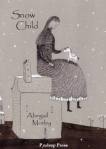 Snow Child (Pindrop Press 2011), 978-0956782243, £8.99
Snow Child (Pindrop Press 2011), 978-0956782243, £8.99
Abegail Morley’s Snow Child gifts us bold, unflinching, memorable poems, dazzling in their precision and clarity. This is a poet who faces life’s wonders, complexities and losses head-on, and invites us on a lyrical journey which will, at times, take our breath away. Catherine Smith![]()
Intensely personal poems of love, desertion, obsession, written with great skill and delicacy yet with a disturbing sparsity and uncanny detachment. Snow Child is a captivating and impressive collection. Malcolm Carson
At the heart of Abegail Morley’s powerful second collection is a deep sense of loss. The poems work at countering that loss with tangible visceral images that both disturb and sing with their own gorgeousness. Morley has captured just what it feels like to be living inside a skin so thin, the sun burns right through in all its lucid glory. Helen Ivory
.
 How to Pour Madness into a Teacup (Cinnamon Press 2009), 9781907090004, £7.99
How to Pour Madness into a Teacup (Cinnamon Press 2009), 9781907090004, £7.99
Shortlisted for the Forward Prize Best First Collection.
It has fallen to Abegail Morley to draw aside the veil suspended between the world we know and the unholy of unholies that lies beyond. We are shown the painted veil of everyday life, only to have it slashed with a knife before our eyes, allowing us to glimpse the horror that lies within, sometimes frightening but always lit with a strange visionary beauty. Morley’s poems are daredevil ambassadors to a savage place. Hugo Williams
Leave a comment